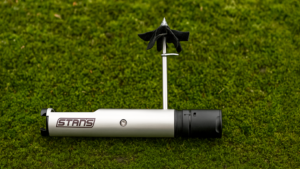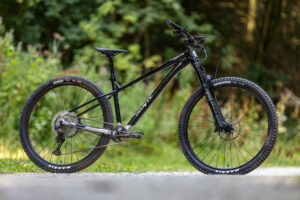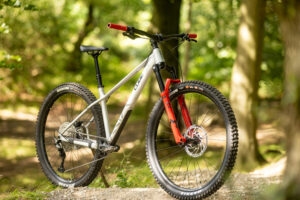Consistently put a smile on our faces
Rocky Mountain Pipeline Carbon 50 (2018) review

Trail Bike of the Year in association with Alpinestars
The Rocky Mountain Pipeline Carbon 50 uses a single frame for both this Pipeline Plus bike and the big wheel Rocky Mountain Instinct 29er.
>>> 27.5in Plus Trail Bike of the Year Winner: Scott Genius 720
Considering there’s only one Pipeline model for sale in the UK and two Instincts, it’s obvious which one Rocky Mountain feels will be more popular. Either way, if your budget doesn’t align with the Pipeline 50, there are options above and below in the Instinct range that will happily accept 27.5 Plus wheels.

Rocky Mountain Pipeline Carbon 50 review
Back to the chassis though, and while it shares a similar profile to its predecessor, it’s actually had a comprehensive overhaul for 2018. Not only is the new frame significantly more refined – with smooth radii everywhere and clean, low-profile hardware – all the pivots now rotate on bearings, rather than bushings. We also like the fact that Rocky’s signature Ride 9 compendium of geometry and suspension settings now sits within the shock link, rather than halfway along the top tube, where it used to knock against your knees.
This system gives you the opportunity to customise the handling and feel of your Pipeline in nine different ways. The window of adjustment is one degree at the head and seat angle, and 13mm at the bottom bracket, while simultaneously changing the progression of the suspension too. It sounds bewildering, but all of the permutations are precisely catalogued on Rocky’s website, so it’s always easy to get back to ground zero.
Suspension
While the Ride 9 system is a nice selling point, we have a feeling the designers and engineers really designed the bike to be ridden in position one – the most progressive suspension allied to the slackest geometry. So that’s what we did. And we immediately questioned why we’d ever want to run it in any of the other positions. Perhaps for a bit of extra pedal clearance if you ride trials-y terrain, but fitting shorter 170mm cranks would do the same job, to a lesser degree, without upsetting the rest of the geometry.
The small-bump response is buttery smooth thanks to that full complement of bearings (even the shock eyelet uses one). If you’ve read our first ride on the Ancillotti Scarab Evo 29, that will sound completely contradictory, but the difference here is that bearings lend themselves much better to the Pipeline’s mass production techniques.
There’s no shortage of grip, then, and in complete contrast to the Intense, the Pipeline feels like it has more than 140mm of travel, and it takes deeper holes and braking bumps in its stride.
Better still, the shock works in perfect unison with the Fox 34 suspension fork, and its self-lubricating Grip damper, so you can attack the rowdiest of trails without getting completely out of shape.
Components
With the most aggressive tread pattern on test, the Pipeline’s Minion DHF/DHR tyre combo generates as much confidence as it does grip. Even though neither use the multi-compound 3C rubber, the deep, stable blocks cut into pretty much any soil type and ensure sure-footed cornering and tenacious traction, whether braking or accelerating. The carcass is also stiffer than the popular Rekon, so you can run slightly lower pressures and there’s less chance of tearing a sidewall. In fact, we think Rocky could save some weight without compromising the ride by dropping down to a narrower 35mm wide rim.
Performance
Although we’ve rated them equally, the Pipeline and the Intense ACV Pro sit at opposite ends of the spectrum in terms of ride and handling.
While the ACV is a rapid and highly efficient pedalling machine, the Rocky Mountain is a bit stodgy under power, and always feels a bit draggy on long rides. But it comes alive on the descents with an infectious, engaging ride quality and capable suspension. It’s hard not to get carried away when you ride it; sessioning turns, playing on jumps and generally acting like a bit of a child. And we think that’s a very good thing.

Verdict
Much as it consistently put a smile on our faces, one thing about the Pipeline had us scratching our heads. While the geometry is designed around a 150mm fork, Rocky fits a 140mm Fox and a 10mm spacer under the head tube. This just doesn’t make sense to us. We’d much rather have a bit of extra travel up front than an inert lump of alloy. It would also be a marginally better bike with shorter cranks, narrower rims and a wider bar, but these are minor details and don’t really detract from the ride experience. The new Pipeline is leagues ahead of its predecessor, is an absolute scream on technical terrain and, in this test, pulls the pants down on one of the most iconic suspension bikes on the planet. For a small brand like Rocky Mountain, that’s impressive.















